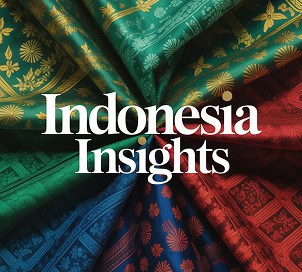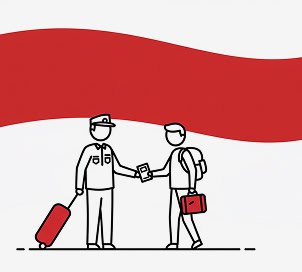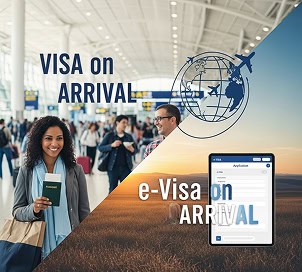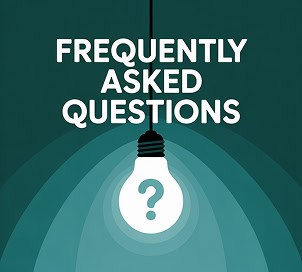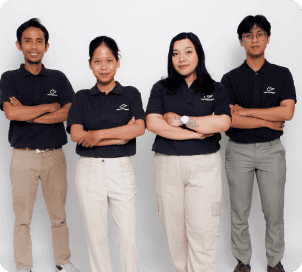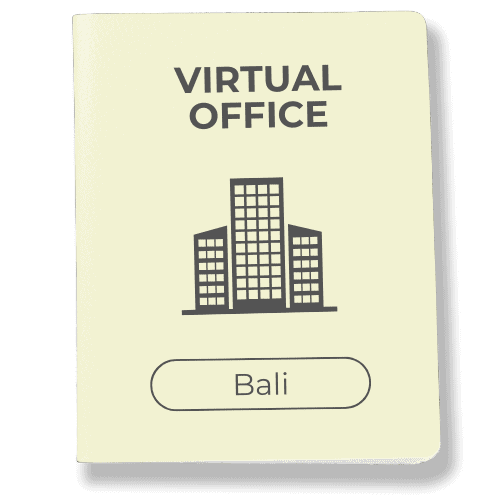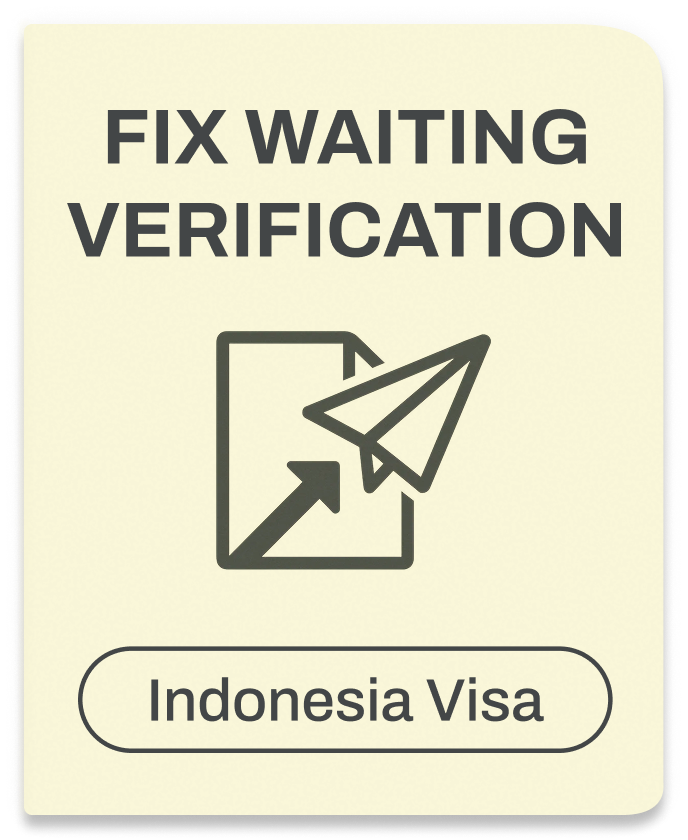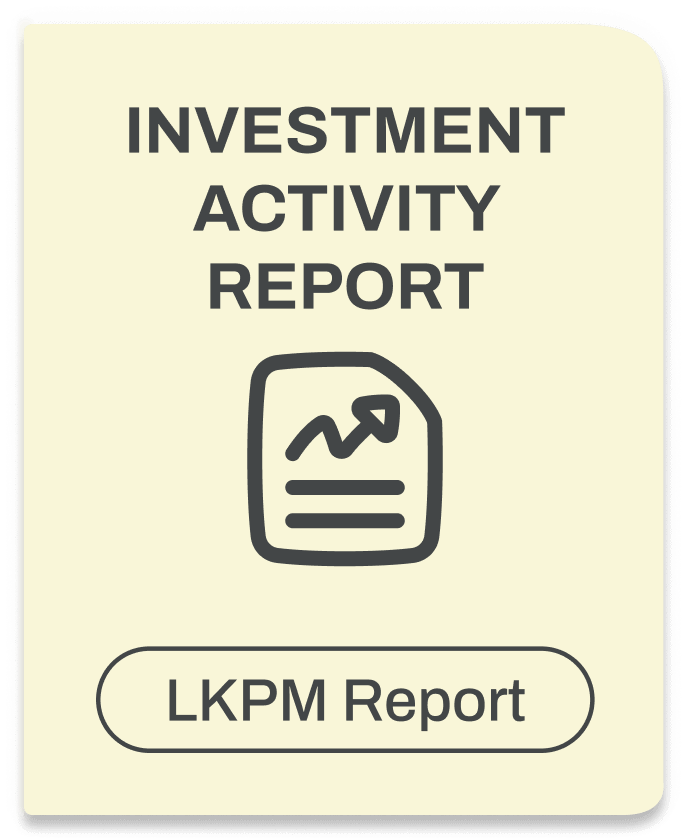Digital Nomads on Visa on Arrival: Smart or Risky Bet
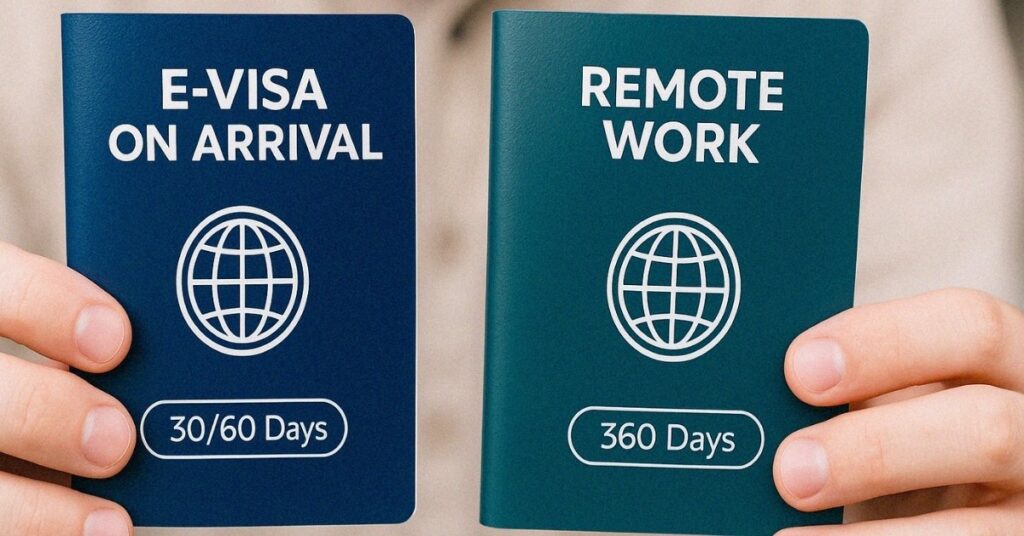
If you’re working from Bali on a Visa on Arrival, you’re on the wrong visa. Here’s the compliant, stress-free path.
This guide is for digital nomads, remote workers, founders, freelancers, agency owners, and content creators considering Indonesia as a base. Here’s my promise: no loopholes, no myths, no “everyone does it so it’s fine.” Just what actually aligns with current Indonesian regulations, checked and reviewed with professional visa consultants.
Disclaimer: This is general information only, not individual legal advice. Regulations change. Always verify with official sources or a licensed consultant.
Powered by the consultants behind Visa-Indonesia.com, a dedicated team helping remote workers, expats, and founders choose the right visa, file correctly the first time, and stay off Immigration’s radar.
Table of Contents
Is It Legal to Work Remotely on a Visa on Arrival?
No. Visa on arrival and tourist visas exist for tourism purposes only. Official rules prohibit profit-making activities and working beyond the limits allowed by those visas. Remote work performed physically in Indonesia is still “work” under a conservative, compliance-first interpretation.
What does that mean?
Using a VOA for your regular online job isn’t what the visa is designed for. It can place you in a non-compliant position. “But everyone does it” doesn’t equal lawful protection if you’re checked.
Here’s the clear positioning: If you plan to work while living in Indonesia, even for a foreign employer, treat VOA as the wrong tool. The safe, professional route is a proper remote worker visa called the E33G.
Understanding Visa on Arrival: Why It’s Not Your Digital Nomad Visa
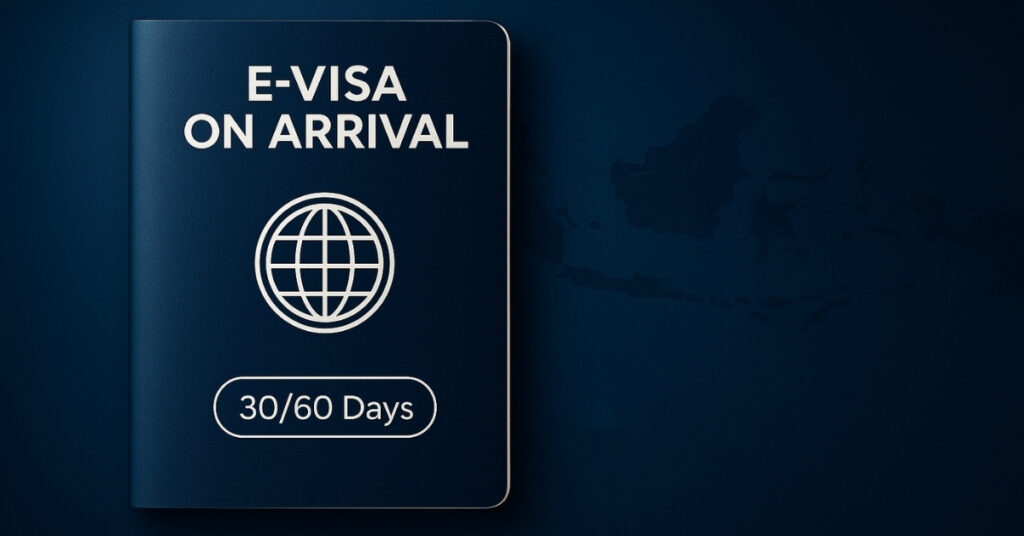
What VOA/e-VOA Is For
The Visa on Arrival gives you 30 days, with one possible 30-day extension. That’s it. It’s designed for tourism, short visits, and select business meetings only.
Use VOA Only If:
- You’re on holiday
- Your stay is under 30–60 days
- Your laptop is only for emergency emails
What’s Explicitly Off-Limits
Any profit-making activities are banned. That includes public speaking for money, providing services, selling goods, or working beyond the visa’s listed activities.
Why Remote Work Falls Into the Risk Zone
You’re physically in Indonesia performing ongoing work. Immigration crackdowns increasingly target “working without a proper permit or visa.” Being paid abroad doesn’t magically reclassify working as “tourism.”
Think of it this way: if your laptop is how you pay rent, you should not rely on a VOA.
Key takeaway? VOA equals a short holiday. That’s all.
The Legal Path for Digital Nomads: E33G Remote Worker Visa
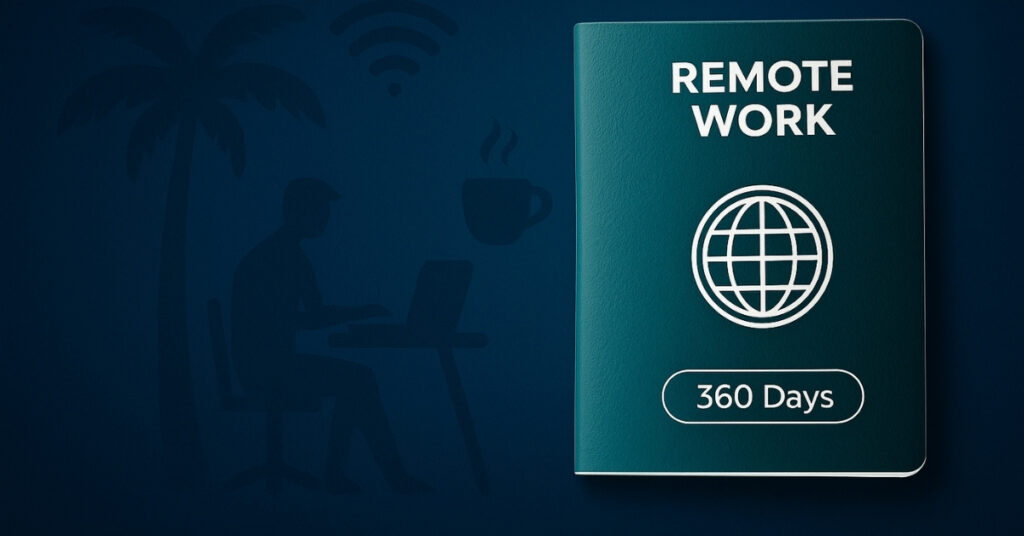
What Is the E33G?
The E33G is Indonesia’s Remote Worker and Digital Nomad stay permit. It’s built for foreigners employed by or contracted to entities outside Indonesia.
Core Requirements (Summarized)
You need a foreign employer or foreign clients. You need a minimum annual income of USD 60,000 and a bank statement for the past 3 months totaling USD 2,000. You also need a valid passport, health insurance, a clean record, and supporting documents.
Important: Requirements may change; always confirm via official Immigration sources or a reliable visa agent.
What You Can Do on E33G
With an E33G, you can:
- Live in Indonesia for up to one year (360 days) under a permit designed for remote professionals, not short-term tourists.
- Work remotely for a foreign employer or foreign clients while physically based in Indonesia, in line with the visa’s intended purpose.
- Attend networking events, meetups, and professional communities relevant to your remote role, as long as you’re not taking on work from Indonesian entities.
- Travel in and out of Indonesia during your permitted stay (according to current E33G conditions), without playing “visa roulette” every few weeks.
- Plan your life like an actual resident, not like someone counting down 30-day stamps and praying nothing changes.
What You Still Cannot Do
No selling goods or services to Indonesian clients. No local employment contracts with Indonesian entities.
Why Serious Nomads Should Switch
The E33G is a better fit for long stays, compliance, and protecting your brand reputation.
Skip the guesswork. With Visa-Indonesia.com, you get a done-for-you E33G Remote Worker Visa process: document check, application, monitoring, and local support so that you can work remotely in Indonesia 100% above board.
VOA vs E33G vs Other Options
Let’s make this practical.
If You’re on Holiday for Less Than 30–60 Days
VOA or e-VOA is fine. But keep work to a bare minimum. We’re talking urgent emails only. Don’t market or sell services from Indonesia.
If You’re Relocating Your Laptop Life to Indonesia
E33G is the recommended route. It’s designed for people like you.
If You’re Building or Running an Indonesia-Facing Business
Consider a PT PMA (foreign-owned company) plus an Investor or Work KITAS, or other relevant stay permits.
Quick Comparison
| Visa Type | Purpose | Max Stay | Work Allowed? | Who It’s For | Risk Level |
| VOA/e-VOA | Tourism, brief business | 30–60 days | No, not designed/approved for ongoing remote work; high risk if used as your work base | Tourists, short-term visitors | High if working |
| E33G | Remote work for foreign entities | 1 year | Yes, for foreign clients/employers | Digital nomads, remote workers | Low |
| PT PMA + KITAS | Indonesia-based business | Long-term | Yes, local work allowed | Business owners, investors | Low |
Not sure where you fit? Use our quick “Visa Finder?” check and get a recommendation reviewed by our consultants at Visa-Indonesia.com, free, no fluff.
What Illegal Remote Work Looks Like (So You Don’t Accidentally Do It)
Red-Flag Behaviors on VOA
Hosting retreats, workshops, paid photoshoots, or surf lessons while on a tourist visa? That’s illegal work. So are paid collabs with Indonesian brands or venues. Running tours, classes, or services targeting people in Indonesia? Also not allowed.
Even for Purely Remote Jobs
Long-term, structured work while on a tourist or VOA status is outside the visa’s intended use. During inspections, screenshots, social media posts, coworking space visits, and events can all serve as evidence against you.
If your brand, content, or business is public, you’re leaving a paper trail. Assume Immigration can see what your followers see.
Possible Consequences
Fines. Detention. Deportation. Blacklisting from re-entering Indonesia. Reputational damage that follows you online and professionally.
Worried you’ve been on the wrong visa? Our team at Visa-Indonesia.com quietly reviews your case and helps you switch to a compliant visa before it becomes a problem.
Step-by-Step: How to Switch from VOA to Digital Nomad Visa
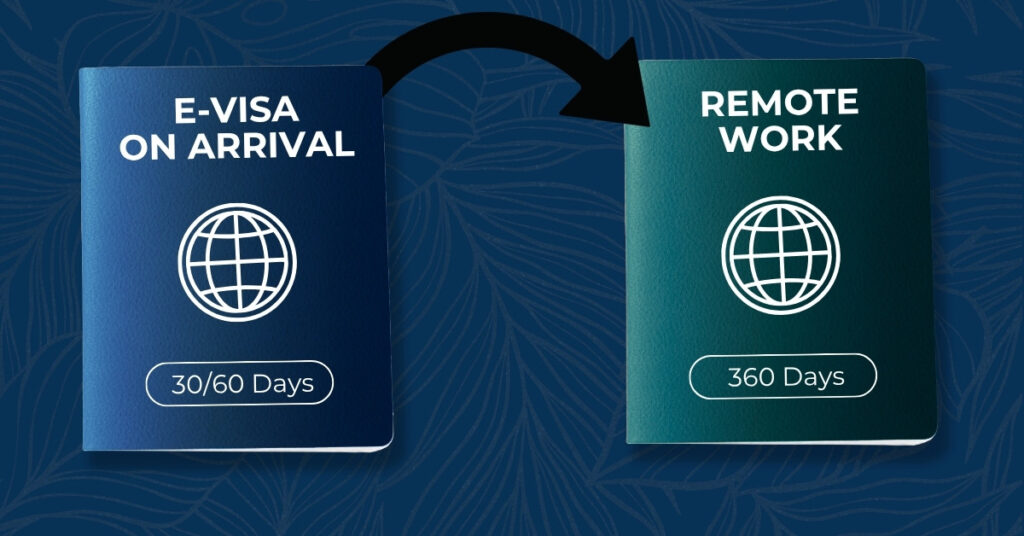
- Step 1: Stop Stacking Risk: Don’t keep extending a non-compliant pattern. Make a plan to fix your status now.
- Step 2: Map Your Profile: Are you an employee, a freelancer, or a business owner? What’s your income level? How long do you intend to stay?
- Step 3: Choose the Right Route: Go with E33G if you’re a remote worker with foreign income. Consider PT PMA plus KITAS or other permits if you have Indonesia-facing operations.
- Step 4: Prepare Documents & Apply: Gather contracts, income proof, bank statements, insurance documents, and anything else required. Get them ready before you submit.
- Step 5: Timeline & Follow-Up: Know when to apply. Understand what to do if you’re already in Indonesia. Learn how to avoid gaps in your legal status.
Compliance for Digital Nomads: Tax, Residency & Public Footprint
The 183-Day Rule & Tax Residency
If you spend 183 days or more in Indonesia during a calendar year, you may become a tax resident. That opens up tax obligations. It’s not automatic for everyone, but it’s something to watch.
Foreign-Sourced Income vs Indonesia-Sourced Income
Income from clients or employers outside Indonesia is generally treated differently from income earned within the country. The rules get complex fast.
Why Visa Compliance + Tax Compliance Go Together
Getting the right visa (like E33G) doesn’t replace tax planning; it’s the first half of being truly compliant. Immigration and tax authorities can share information.
Social Media, Coworking & Public Visibility
Don’t advertise illegal work. Align your online footprint with your legal status. If you’re filming content in Bali or posting about “working from paradise,” make sure your visa matches what you’re publicly claiming to do.
Always consult licensed tax advisors.
FAQs Digital Nomads Actually Ask
Is checking Slack and email on VOA allowed?
Checking urgent messages during the holiday time is allowed. But systematic, daily work? That crosses the line. We still recommend getting a proper visa if Indonesia is your base.
If I’m paid to my US/EU bank, is that okay?
No automatic exemption. Where your paycheck lands doesn’t change where you’re physically working.
Can I convert from VOA/B211A to E33G without leaving Indonesia?
It depends on current regulations and your specific situation. Some conversions are possible. Others require leaving and re-entering. Check with Visa-Indonesia.com for the latest procedures based on your case.
Can my partner/kids join me on E33G?
Yes. Indonesia offers dependent visas for spouses and children of E33G holders. Requirements vary, but it’s doable.
Can I still travel in and out freely on E33G?
Yes, with proper documentation. The E33G doesn’t lock you in. You can travel regionally or internationally and return.
Ready to Apply or Extend Your Visa?
Let our visa specialists handle your application.
